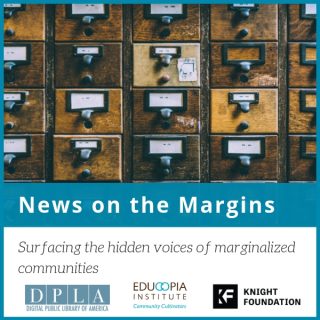
2017-2018
News on the Margins (subcontract)
The voices of marginalized communities, including those defined by such identity markers as skin color, ethnic origin, religious affiliation, sexuality, geography, and social class, are often invisible in mainstream news sources. Understanding the diverse experiences of people in the United States requires us to turn to sources written, produced, and disseminated by the broadest possible constellation of people.
Archives, libraries, and museums have rarely collected these sources at the time that they were published. Instead, community members have typically saved these newspapers in attics, closets, and basements; their value for the historical record is often recognized by archives, libraries, and museums many years after their production. Once these sources are collected, they are often cataloged and provided in individual organizational frameworks, making them very difficult to track across libraries and archives.
This project seeks to activate the power and passion of archivists, librarians, and curators to collaboratively and comprehensively record where these resources are, what condition they are in, what formats they include, and what level of accessibility they have for the public. Beginning in mid-August of 2017, the project team launched a nationwide campaign to record this information, archive by archive, library by library, and museum by museum, using crowdsourcing technologies and methodologies.
This initial pilot project, undertaken by Educopia Institute in partnership with the Digital Public Library of America (DPLA) and with funding from the John S. and James L. Knight Foundation, enabled our project team to create an open data collection framework and methodology for information about newspapers by and for marginalized communities. We also produced and released (openly and freely) two datasets: a digital directory of African American newspapers and a digital directory of LGBT newspapers based on the data gathered in this pilot project. Finally, we produced a white paper synthesizing the project’s findings and recommendations for next steps, including priorities for aggregation and other tasks that memory organizations might collaboratively undertake in the future to increase access to these crucial historical sources.
Project Outputs:
- News on the Margins: Surfacing Marginalized Voices in the News Collections of Libraries, Archives, and Museums, published 16 April 2018
- News on the Margins: Data Model, published 14 April 2018
- Data Visualizations, published 10 February 2018
- A Database of African American Newspapers and Periodicals, published 30 September 2017
- A Database of LGBT Newspapers and Periodicals, published 30 September 2017
Advisory Board:
- Cheryl Ball (West Virginia University)
- Randall Burkett (Emory University)
- Nick Graham (UNC Chapel Hill)
- Reinette Jones (UKY)
- Ana Krahmer (UNT)
- Sam Meister (Educopia)
- Jessica Meyerson (Educopia)
- Nancy McGovern (MIT)
- Cal Shepard (State Library of North Carolina)
- Kopana Terry (UKY)
- Tyler Walters (Virginia Tech)
- Rochelle Williams (Gather Consulting)
Project Partners:
- Digital Public Library of America